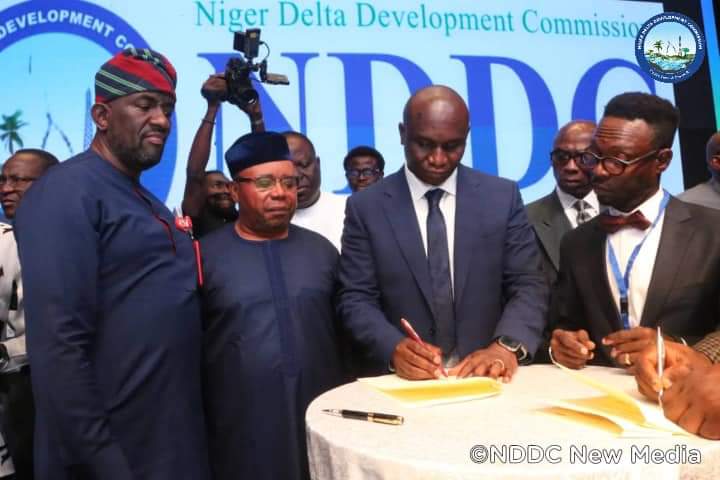NDDC To Link Nine Oil Producing States With $15B Rail Project

A $15 billion railway project that will link the nine oil-producing states in the country is in the offing courtesy of Niger Delta Development Commission (NDDC).
The proposed project is a major component of a Memorandum of Understanding (MoU) signed by the Niger Delta Development Commission (NDDC) and United States-based Atlanta Global Resources.
Atlanta Global’s Director, Tony Akpele, told reporters at the sidelines of the NDCC Public-Private Partnership Summit 2023 in Lagos yesterday, that full details of the rail project would be made known in due time.
The summit with the theme: “Rewind to Rebirth,” was organised by the NDDC to harness ideas on other ways of funding infrastructure in the oil-producing states of Abia, Akwa Ibom, Anambra, Bayelsa, Delta, Edo, Imo, Ondo, and Rivers.
Minister of Niger Delta Affairs, Umana Umana; Senator-elect Adams Oshiomhole; Managing Director of the intervention agency, Samuel Ogbuku; and Executive Secretary, Nigerian Content Development and Monitoring Board (NCDMB), Simbi Wabote were among prominent Nigerians at the event.
The summit also served as opportunity for the commission to highlight its challenges, achievements and plans.
The commission revealed that 2,000 communities in five local government areas in Ondo State will begin to enjoy electricity supply from a power plant to be inaugurated in the next few weeks.
Umana commended the NDDC for adopting the Public Private Partnership (PPP) model as a vehicle for driving sustainable development of the nine NDDC states.
He explained that summit was in line with Federal Government’s desire to harness the expertise and energies of all stakeholders and partners .
Umana added: “We have set in motion an era of accountability and transparency by publishing in national newspapers, a list of 2,506 completed projects executed by the commission under the Buhari administration from 2015 to 2022.”
The minister also explained that the process of recovering monies paid contractors of 4,000 cancelled projects had commenced.
The minister, who explained that the Federal Government approved the implementation of some of the key recommendations of the Forensic Audit into the activities of the NDDC, also said that the White Paper on the Forensic Audit Report was being awaited.
His words: “As recommended in the report, contracts for 4,000 projects were cancelled for non-performance and the cancellation was published in the newspapers. The process for recovering money paid for the cancelled contracts has begun.”
He assured that plan is fully on for the Niger Delta region to optimise the benefits from its abundant natural resources, especially oil and gas, which have contributed significantly to the national economy and development.
Umana noted, however, that the Niger Delta faces many challenges, such as environmental degradation, poverty, unemployment, insecurity and underdevelopment.
He said: “The Federal Government recognises the need to address these challenges and to ensure that the people of the Niger Delta enjoy the benefits of their resources and potential.”
But Umana pointed out that the ministry and the NDDC alone would not be able to meet all the developmental needs and aspirations of the Niger Delta people.
He warned the management of the commission against engaging in political activities while carrying out their assignments. He said that that had led to conflict between the commission and host governors of the nine states.
NDDC Managing Director Ogbuku said that the commission decided to adopt the PPP model to provide alternative sources of funding for its key development projects and programmes.
His words: “As part of our efforts to renew and reposition the NDDC, the Governing Board stepped up the collaboration with various stakeholders.
“We have started engagement with the key stakeholders, such as the oil companies who contribute three per cent of their operational budget to the Commission; the state governments; traditional rulers; Civil Society Groups; youth organisations and Contractors.
“We are showing in our operations, through our example and conduct, how diligence, due process and transparency are key ingredients to building confidence and trust among all partners and stakeholders. We are committed to not just being transparent, but we want to be seen to be transparent.”
Listing the commission’s achievements, he said: “In the coming weeks, some of our major projects will be inaugurated. Among this is the 132/33kv sub-station constructed by the Commission in Okitipupa, which will provide electricity for over 2,000 communities spread across five local government areas of Ondo State.”
The NDDC boss added that “another key project that is ready for inauguration is the Ogbia-Nembe Road, which was jointly funded by Shell Petroleum Development Company (SPDC) and the NDDC.”
Wabote reiterated that the $50 billion Niger Delta Regional Master Plan launched in 2007 for implementation over a 15-year period was to transform the Niger Delta into a prosperous and peaceful region.
He said: “Various reasons have been adduced for the failure of the implementation of the ND Master Plan ranging from insufficient funding, frequent change in leadership, delays in budget approvals, and others.
“While these reasons are plausible, I believe there is opportunity to go back to the drawing board and put together a modified or an entirely new Niger Delta Master Plan for implementation.”
Related: RSEYLC Group Pays Courtesy Visit To The Chairman, NDDC Board, Lauretta Onochie.
Adams Oshiomhole, a former All Progressives Congress (APC) chairman and now Senator-elect, advised the NDDC management to promote inclusive and sustainable development in the region.
“How can you talk of corporate governance where you have a sole administrator running the commission? The law states how NDDC should be governed,” he said.
Oshiomhole stressed that what Nigerians and the National Assembly expected was a commission working more efficiently and equitably to achieve its goals.
This, according to him, include proper corporate governance framework which improves institutional capacity and reduces widespread and systemic corruption to its nearest level.

